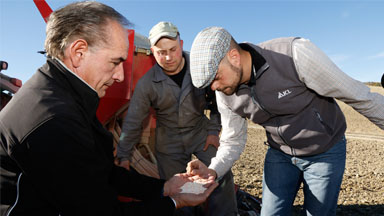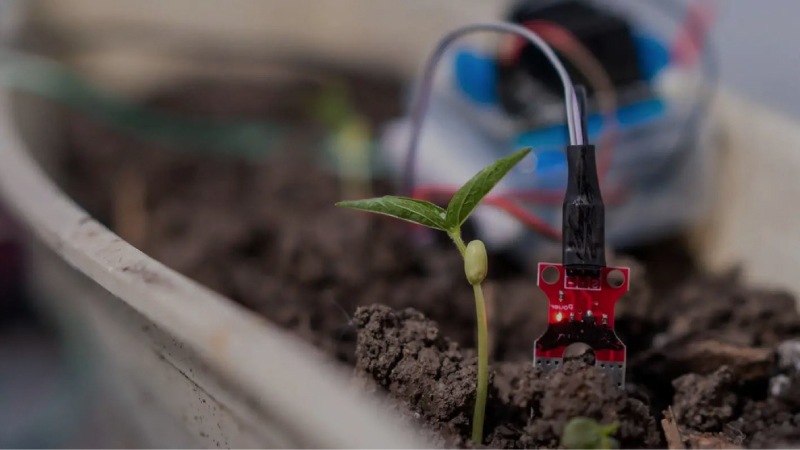Ask an Agronomist: What does the future hold for crop management?
Ask An Agronomist
What does the future of crop management look like? We continue to face complex challenges in agriculture, and while essential plant nutrient needs haven’t changed much, what has changed is how we deliver these nutrients to our plants. We asked ICL’s agronomist a few questions about fertilizer innovation, leveraging global knowledge to create local solutions, and what new crop nutrition tools are coming down the road. Here’s the dirt.
The Agronomist
Jason Haegele, ICL Growing Solutions, North American Agronomy Lead
Jason Haegele leads ICL’s research collaborations with universities and third-party research contractors in North America to demonstrate the efficacy of ICL products on a wide range of row crops and specialty crops. He is a graduate of the University of Illinois and Iowa State University. He has a broad range of experience in applied research and field sales support for plant nutrition, adjuvant, crop protection, and biological products.

Jason Haegele, Ph. D, ICL Growing Solutions, North American Agronomy Lead, spearheads third-party research in North America to demonstrate the efficacy of ICL products.
From an agronomist’s perspective, what does the future of crop nutrient management look like? What is coming down the road that will be different?
As dawn appears on the horizon, a robotic soil sampler’s soft hum and mechanical clicks can be heard as it completes a night of real-time soil sampling between the verdant rows of a farm field. Controlled-release fertilizers, intentionally chosen for the soil type and crop grown in this field and applied weeks ago, have been precisely releasing their contents according to plan. Meanwhile, advanced weather and crop modelling are predicting a bumper crop. By 7 AM, the local agronomist has compared the night’s soil scans to the readings of nutrient sensors embedded in plants throughout the field and has concluded that the current nutrient status in this field is inadequate to support the predicted yield potential. By mid-morning, a swarm of drones has been dispatched to apply foliar nutrition based on the agronomist’s prescription. This sequence of events is repeated every couple of weeks in response to changing weather events and evolving crop yield potential. After the crop is harvested in a couple of months, a carefully selected cover crop and a consortium of microbes will be established to maintain the soil health of this field and prepare for next year’s challenges.

ICL has more than 600 agronomists and advisors around the world working together with R&D teams, researchers, and local experts to optimize crop care.
Does this sound far-fetched? For some, this scenario may seem distant in the future, and certain aspects are already a reality for others. As an agronomist, I do not doubt that new scientific discoveries and technological innovations will continue to shape crop nutrient management, and the future that I have just described is one based on using analytics, automation, advanced fertilizer technology, and biology to improve the productivity, reliability, and sustainability of our food system.
Why is innovation needed for crop nutrient management?
Fertilizers and crop nutrient management may not always be the most glamorous career, but crop nutrition is fundamental to human society and health. Plants are the masters of assimilating energy and nutrients that would otherwise be inaccessible to humans and animal life. Think about it… energy from sunlight, carbon from the air, and mineral nutrients from the soil enable our lives because of plants’ wonder and the microbes they associate with. Crop nutrition optimizes plant growth and replenishes soil fertility making it possible for 7 billion people to exist. Innovation is needed to find new and improved ways of using finite resources like mined mineral nutrients, biological strategies to fix nitrogen to complement the Haber-Bosch process, and efficient, cost-effective ways to recycle nutrients like N and P from waste streams. Continued innovation in crop nutrient management builds the foundation for a better tomorrow.
How does ICL approach innovation?
Access to talent and new ideas is often a limiting factor for continued innovation. Worldwide, ICL has over agronomists — shoulder-to-shoulder with R&D scientists, engineers, and business experts. Talent and ideas are abundant. ICL actively seeks new solutions from this internal team and invests in the most-promising external partners. We quickly evaluate new ideas for technical feasibility and business potential and develop the best opportunities for new products and technologies.

New ICL products can be tested on Plantarray, by Plant-DiTech, in the iCORE incubator, with most effective materials to be further developed for potential commercialization.
ICL is a global company. How does ICL leverage global knowledge to deliver local results?
All agronomy is local. Every country, state, county, farm, and individual field will have specific agronomic challenges dictated by factors like weather, soil type, and economics. That being said, there are often reoccurring agronomic challenges across the world. Because of ICL’s global network, we can learn from the experiences and recommendations of teammates on the other side of the world to find solutions to local problems. One example is Nova PeKacid®. Developed in Israel as an acidifying source of P and K for the high pH soils and challenging irrigation water quality parameters of Israeli desert agriculture, PeKacid is right at home in bringing value to irrigated agriculture in California and the desert southwest.
What new products or technologies from ICL are you most excited about?
As ICL’s North American Agronomy Lead, I get a sneak peek at products and technologies taking shape in many other parts of the world. There are many things to be excited about. ICL’s current focus on fertilizers created from recycled nutrients, a controlled-release fertilizer with a biodegradable coating (eqo.x™), and low-salt index, high-analysis water soluble fertilizers for low-volume foliar applications by drone (FertiBuzz™) are new developments that excite me. While not all of these will be immediately available in the US, ICL’s portfolio of solutions for US growers will continue to expand in 2023 with the introduction of unique water-soluble fertilizers from Brazil, some of which contain micronutrients like molybdenum, nickel, and cobalt. Controlled-release coatings, nutrient stabilizers, pH optimizers, and biologicals are all other examples of ICL fertilizer innovations that improve how we deliver nutrients to plants. Over the next decade, I imagine we will see these technologies combined in new and exciting ways to promote agricultural productivity and environmental stewardship. It’s an inspiring time to be an agronomist.
Some ICL proprietary products registered abroad may not be available in North America. Please contact your local sales representative or visit us at icl-growingsolutions.com